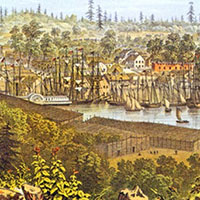
History-Periods
Past eras

From pre-history to today
Choose your period

Pre history - Present
explore the different eras

The Douglas Treaties were a series of agreements made between the British colony of Vancouver Island and local First Nations peoples in the 1850s and 1860s. The treaties were named after James Douglas, the Governor of the colony, who negotiated them. The treaties were designed to secure land for the colony and to establish peaceful relations between the colony and the First Nations. Under the terms of the treaties, the First Nations peoples ceded land to the colony in exchange for goods and services, as well as the recognition of their rights to continue to use and occupy certain areas. The Douglas Treaties are considered to be a significant step towards reconciliation between Canada and First Nations peoples.
James Douglas, the Governor of the colony of Vancouver Island, had a complex relationship with the Indigenous peoples of the region. Douglas is credited with negotiating the Douglas Treaties, a series of agreements between the colony and local First Nations that secured land for the colony and established peaceful relations between the colony and the First Nations.
While Douglas was considered to be a fair and just negotiator by some, others criticized his methods and the treaties themselves, arguing that they were imposed upon the Indigenous peoples without their full understanding or consent. Douglas also played a role in the forced relocation of Indigenous peoples from their ancestral lands to reserves.
In general, Douglas's relationship with Indigenous peoples can be seen as a product of the times in which he lived and the colonial policies of the British Empire. He believed that the colony's expansion and development were necessary for the well-being of all its inhabitants, Indigenous and non-Indigenous alike.
Under the terms of the treaties, the First Nations ceded land to the colony in exchange for goods and services, such as blankets, tools, and food. The treaties also recognized the rights of the First Nations to continue to use and occupy certain areas, such as their traditional hunting, fishing, and gathering grounds. Additionally, the treaties promised that the First Nations would receive annual payments, or annuities, in perpetuity.
The treaties also contained provisions that guaranteed the First Nations the right to self-government and protection of their culture, religion and rights to hunt, fish and gather resources. But these provisions were not always respected or enforced by the colony.
Timeline
There were likely several objectives that James Douglas had in mind when he signed the Douglas Treaties. Some of these may have included:
Securing land for settlement and economic development.
Establishing British sovereignty over the territory and preventing the colonization by other European powers.
Promoting peaceful relations between the settlers and the indigenous peoples.
Obtaining resources such as timber and minerals from the land.
Providing a legal framework for the government to regulate and control the actions of the settlers and the indigenous peoples.
Preventing conflicts and war with the indigenous peoples by recognizing their rights and interests
Providing a way to resolve disputes and maintain order in the colony.
British Columbiahistory.ca is a visitor supported web site. If you would like to submit an article or opinion, please visit our blog at www.blog.British Columbiahistory.ca.
Reference: Article by (Staff Historian), 2023
Tour Reviews
History Attractions
Submit Tour Suggestions
2023/Departures
Spotlight Tours
Events and anniversaries

All content and images are protected by copyright to Access History